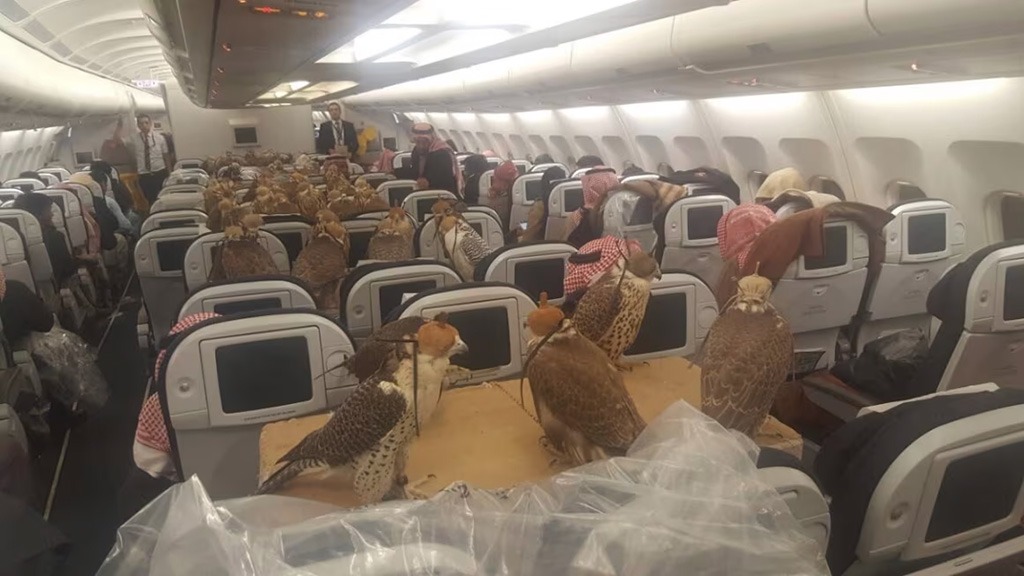In a world where private jets, bespoke itineraries, and discreet concierge services define high-net-worth travel, one Saudi prince once took luxury — and heritage — to an entirely new altitude.
He booked 80 seats on a commercial flight for his falcons.
Yes, falcons.
Hooded, regal, and seated in economy class, the birds were photographed perched neatly in rows, each occupying its own seat on a flight bound for Jeddah. The now-famous image, which first surfaced in 2017 and has resurfaced on social media in recent months, quickly became a viral symbol of Gulf extravagance — but it also told a far richer story.
In Saudi Arabia and across the Gulf, falcons are far more than pets. They are symbols of heritage, nobility, and skill, representing a lineage of desert traditions that stretch back thousands of years.
Falconry — the art of training and hunting with birds of prey — is considered both a sport and a cultural identity marker, with deep Bedouin roots. In several Gulf nations, falcons are so revered that they are issued their own passports, enabling them to travel internationally for hunting expeditions and prestigious competitions.
It’s also an industry worth millions. At the 2025 Saudi International Falcon and Hunting Exhibition in Riyadh, four falcons — three Mongolian and one locally bred — sold for a combined SR 652,000 ($174,000) amid fierce bidding. The highest price went to a Mongolian adult peregrine, or Hur Qirnas, which fetched SR 201,000 ($54,000), while a locally bred Shaheen Farkh from the Dabdaba region sold for SR 161,000 ($43,000).
These figures underscore the cultural, emotional, and financial value of falcons in the Gulf — and help explain why a prince might purchase airline seats for them.
The flight itself reportedly took place aboard an Airbus widebody jet, with nearly 30 rows reserved for the birds. Each falcon was tethered, hooded, and secured in its own seat — a safety measure designed to keep them calm and still throughout the journey.
Airlines across the Gulf, including Qatar Airways, Etihad, and Saudia, have long accommodated falcons as in-cabin passengers. Depending on the carrier, travellers may bring up to six falcons per passenger, with carriers providing specialised handling, certificates, and seat coverings.
Passengers on the Jeddah-bound flight were reportedly treated to a scene that was equal parts surreal and serene. The birds remained composed for the entire journey — no incidents, no commotion, only a soft rustle of feathers and the occasional blink of a sharp eye beneath the hoods.
A lesson in cultural diplomacy
For global business travellers, the story transcends novelty. It is a reminder of how personal values, heritage, and faith can shape luxury travel behaviour at the highest levels.
In the Gulf, hospitality and cultural expression are deeply intertwined. Just as European royals have long travelled with horses or hounds, falcons are viewed as noble companions — and, in many cases, as ambassadors of tradition.
Dr. Ahmed Al-Suhaimi, a Saudi cultural historian, notes that falcons “represent discipline, grace, and courage — virtues long admired by Bedouin tribes.” He adds: “In the modern era, their care and transport have become both a point of pride and a mark of refinement.”
The image of 80 falcons flying economy may seem whimsical, but it hints at the evolving definition of VIP service. As airlines increasingly tailor offerings to cultural and religious preferences, questions arise: Could luxury carriers one day introduce falcon-friendly cabins or bespoke charter services for elite animal transport?
For now, the story remains a rare snapshot of the intersection between tradition, wealth, and innovation — a moment where the sky became both a cultural stage and a symbol of devotion.
Ultimately, this was never just about birds on a plane. It was about heritage taking flight — and the enduring reminder that in the Gulf, even the skies bow to tradition.


